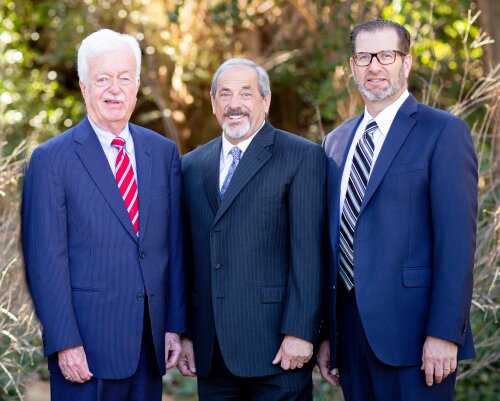Best FDA Law Lawyers in California
Share your needs with us, get contacted by law firms.
Free. Takes 2 min.
Or refine your search by selecting a city:
List of the best lawyers in California, United States
About FDA Law in California, United States
FDA Law forms a crucial legal framework that governs the regulation, safety, labeling, and distribution of food, drugs, medical devices, cosmetics, and tobacco products in the United States. The Food and Drug Administration (FDA), a federal agency, sets standards that impact manufacturers, distributors, healthcare providers, and consumers across the country. In California, FDA regulations intersect with state and local laws, making compliance especially important for businesses and individuals involved in highly regulated industries. California's dynamic market, large population, and additional state public health laws often result in enhanced scrutiny and sometimes stricter requirements than elsewhere in the country.
Why You May Need a Lawyer
There are several scenarios where seeking legal advice in FDA Law becomes necessary. These include starting or operating a business that manufactures, imports, markets, or sells food, supplements, drugs, or medical devices. You may need legal assistance if you are facing an FDA inspection, warning letter, product recall, or enforcement action. Legal expertise can also be critical for label compliance, advertising, or receiving clearances and approvals from the FDA. Additionally, if you are subject to an investigation or litigation related to product safety or consumer complaints, a lawyer can be essential in protecting your interests and navigating complex regulations.
Local Laws Overview
In California, FDA Law is shaped by a unique blend of federal regulations and state-specific provisions. The California Department of Public Health (CDPH) often enforces state laws that supplement or exceed federal requirements, such as the California Sherman Food, Drug, and Cosmetic Law, which closely mirrors the federal Food, Drug, and Cosmetic Act but with some key differences. California’s Proposition 65 also imposes specific warning requirements for chemicals in consumer products, including foods and dietary supplements. The state is known for active consumer protection efforts, including strict requirements for product labeling, ingredient disclosure, and claims about health benefits. Businesses must comply with both FDA and California laws to avoid penalties or recalls.
Frequently Asked Questions
What products are regulated by the FDA in California?
The FDA regulates a wide range of products, including foods, dietary supplements, pharmaceuticals, biologics, medical devices, cosmetics, and tobacco products. In California, these products may also fall under the oversight of state agencies, especially if they are manufactured, distributed, or sold within the state.
What is the California Sherman Food, Drug, and Cosmetic Law?
The Sherman Law is California's primary legal framework for regulating food, drugs, and cosmetics. It generally parallels federal FDA laws but can impose stricter standards in some areas, especially regarding misbranding, adulteration, and product recalls.
Do I need FDA approval before selling a new food, supplement, or device in California?
It depends on the product type. Many foods do not require premarket approval but must meet safety and labeling standards. Medical devices and most pharmaceuticals generally require FDA clearance or approval before commercial distribution. Dietary supplements do not need premarket approval but must comply with labeling and ingredient regulations.
How do FDA inspections work in California?
FDA inspections in California are similar to those nationwide but may coordinate with state agencies. Inspectors review compliance with safety, record-keeping, labeling, and GMP (good manufacturing practice) standards. Companies should be prepared for unannounced inspections.
What should I do if I receive an FDA warning letter or recall notice?
Contact a qualified FDA Law attorney as soon as possible. Prompt, informed action can often minimize the impact and help you address compliance issues or plan for corrective actions.
What is Proposition 65, and how does it affect FDA-regulated products?
Proposition 65 requires businesses to provide warnings about significant exposures to chemicals that cause cancer, birth defects, or reproductive harm. Foods, supplements, and other consumer products may require additional labeling if they contain listed chemicals, regardless of federal FDA compliance.
Can California enforce stricter requirements than the FDA?
Yes. California can enforce standards that are more strict than federal requirements, particularly regarding consumer warnings, chemical disclosures, and specific product ingredients or packaging.
What are the consequences of violating FDA Law in California?
Violations can lead to product recalls, civil penalties, warning letters, product seizures, injunctions, criminal charges, and litigation. State-level enforcement may add fines or additional requirements.
How can companies ensure compliance with both FDA and California laws?
The best approach is to design compliance programs that meet or exceed both federal and state requirements, including regular training, legal review of labels and advertising, robust record-keeping, and proactive engagement with counsel familiar with both jurisdictions.
Are there special considerations for importing or exporting FDA-regulated products in California?
Yes. Imported products must meet FDA entry requirements, and California may have additional licensing or reporting obligations. Exporting products from California requires ensuring that both federal export requirements and destination country regulations are satisfied.
Additional Resources
Several agencies and organizations provide information and support regarding FDA Law in California. The following resources may be helpful:
- Food and Drug Administration (FDA) - the primary federal agency for regulation
- California Department of Public Health (CDPH) - oversees food, drug, and device safety at the state level
- California Office of Environmental Health Hazard Assessment (OEHHA) - administers Proposition 65
- California Attorney General's Office - handles consumer protection and enforcement
- State and local Bar Associations - provide lawyer referrals and educational materials
- Industry groups and trade associations - offer compliance guidance for specific products
Next Steps
If you believe you need legal assistance in FDA Law in California, the following steps can help you get started:
- Gather all relevant documentation, such as warning letters, inspection reports, product labels, and correspondence with regulators
- Research legal professionals or law firms with experience in FDA Law and California-specific regulations
- Schedule a consultation to discuss your situation, potential risks, and compliance strategies
- Take proactive steps to address any immediate compliance gaps, recalls, or enforcement actions under legal guidance
- Monitor ongoing regulatory developments at both the federal and state levels that may affect your business
By understanding the interplay between FDA Law and California requirements, and seeking experienced legal guidance when necessary, you can better protect your interests and ensure compliance with a complex landscape of laws and regulations.
Lawzana helps you find the best lawyers and law firms in California through a curated and pre-screened list of qualified legal professionals. Our platform offers rankings and detailed profiles of attorneys and law firms, allowing you to compare based on practice areas, including FDA Law, experience, and client feedback.
Each profile includes a description of the firm's areas of practice, client reviews, team members and partners, year of establishment, spoken languages, office locations, contact information, social media presence, and any published articles or resources. Most firms on our platform speak English and are experienced in both local and international legal matters.
Get a quote from top-rated law firms in California, United States — quickly, securely, and without unnecessary hassle.
Disclaimer:
The information provided on this page is for general informational purposes only and does not constitute legal advice. While we strive to ensure the accuracy and relevance of the content, legal information may change over time, and interpretations of the law can vary. You should always consult with a qualified legal professional for advice specific to your situation.
We disclaim all liability for actions taken or not taken based on the content of this page. If you believe any information is incorrect or outdated, please contact us, and we will review and update it where appropriate.
Browse fda law law firms by city in California
Refine your search by selecting a city.
















